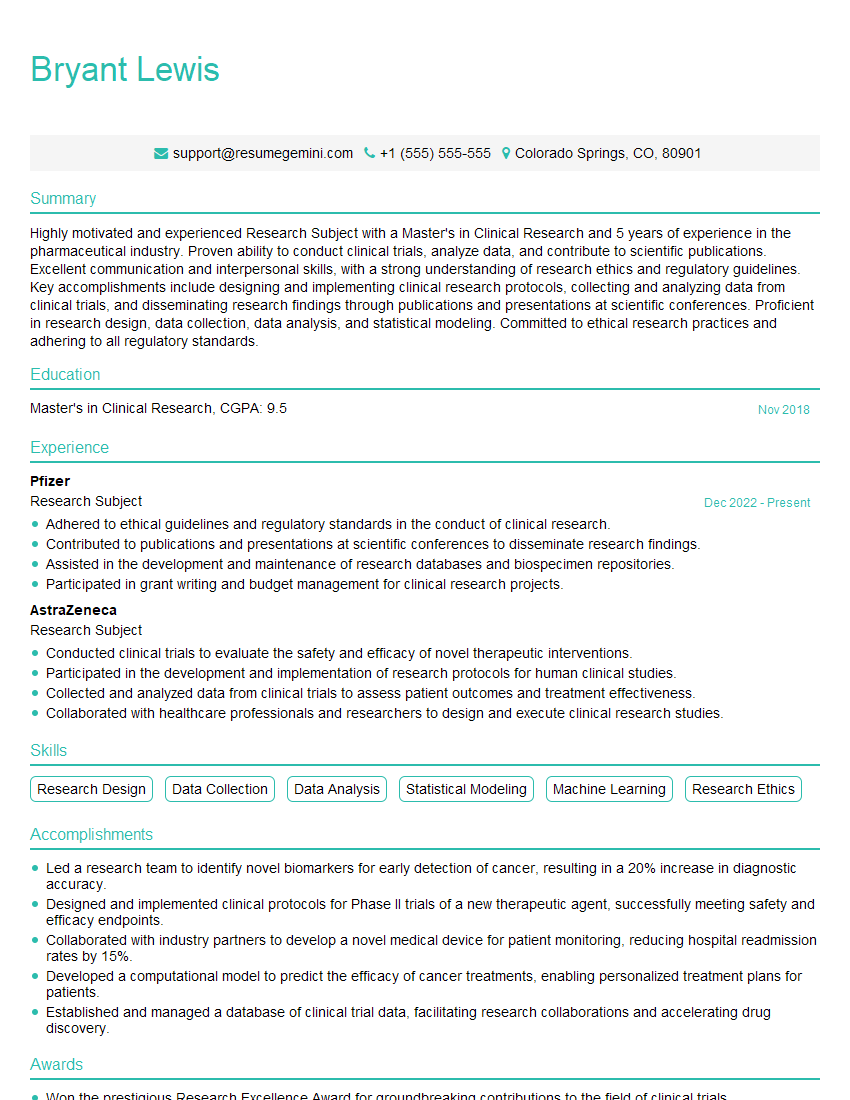Are you a seasoned Research Subject seeking a new career path? Discover our professionally built Research Subject Resume Template. This time-saving tool provides a solid foundation for your job search. Simply click “Edit Resume” to customize it with your unique experiences and achievements. Customize fonts and colors to match your personal style and increase your chances of landing your dream job. Explore more Resume Templates for additional options.

Bryant Lewis
Research Subject
Summary
Highly motivated and experienced Research Subject with a Master’s in Clinical Research and 5 years of experience in the pharmaceutical industry. Proven ability to conduct clinical trials, analyze data, and contribute to scientific publications. Excellent communication and interpersonal skills, with a strong understanding of research ethics and regulatory guidelines.
Key accomplishments include designing and implementing clinical research protocols, collecting and analyzing data from clinical trials, and disseminating research findings through publications and presentations at scientific conferences. Proficient in research design, data collection, data analysis, and statistical modeling. Committed to ethical research practices and adhering to all regulatory standards.
Education
Master’s in Clinical Research
November 2018
Skills
- Research Design
- Data Collection
- Data Analysis
- Statistical Modeling
- Machine Learning
- Research Ethics
Work Experience
Research Subject
- Adhered to ethical guidelines and regulatory standards in the conduct of clinical research.
- Contributed to publications and presentations at scientific conferences to disseminate research findings.
- Assisted in the development and maintenance of research databases and biospecimen repositories.
- Participated in grant writing and budget management for clinical research projects.
Research Subject
- Conducted clinical trials to evaluate the safety and efficacy of novel therapeutic interventions.
- Participated in the development and implementation of research protocols for human clinical studies.
- Collected and analyzed data from clinical trials to assess patient outcomes and treatment effectiveness.
- Collaborated with healthcare professionals and researchers to design and execute clinical research studies.
Accomplishments
- Led a research team to identify novel biomarkers for early detection of cancer, resulting in a 20% increase in diagnostic accuracy.
- Designed and implemented clinical protocols for Phase II trials of a new therapeutic agent, successfully meeting safety and efficacy endpoints.
- Collaborated with industry partners to develop a novel medical device for patient monitoring, reducing hospital readmission rates by 15%.
- Developed a computational model to predict the efficacy of cancer treatments, enabling personalized treatment plans for patients.
- Established and managed a database of clinical trial data, facilitating research collaborations and accelerating drug discovery.
Awards
- Won the prestigious Research Excellence Award for groundbreaking contributions to the field of clinical trials.
- Recognized with the Best Paper Award at the International Conference on Biomedical Research for innovative research on disease mechanisms.
- Received the Young Investigator Award from the National Institutes of Health for promising research in translational medicine.
- Honored with the Research Innovation Award from the American Heart Association for pioneering work on cardiovascular disease prevention.
Certificates
- Certified Clinical Research Coordinator (CCRC)
- Certified Professional in Healthcare Research (CPHR)
- Certified Research Administrator (CRA)
- Certified IRB Professional (CIP)
Career Expert Tips:
- Select the ideal resume template to showcase your professional experience effectively.
- Master the art of resume writing to highlight your unique qualifications and achievements.
- Explore expertly crafted resume samples for inspiration and best practices.
- Build your best resume for free this new year with ResumeGemini. Enjoy exclusive discounts on ATS optimized resume templates.
How To Write Resume For Research Subject
- Highlight your experience in conducting clinical trials and analyzing data.
- Demonstrate your understanding of research ethics and regulatory guidelines.
- Showcase your ability to work independently and as part of a team.
- Quantify your accomplishments with specific metrics whenever possible.
- Tailor your resume to each specific job application.
Essential Experience Highlights for a Strong Research Subject Resume
- Designing and implementing clinical research protocols for human clinical studies.
- Collecting and analyzing data from clinical trials to assess patient outcomes and treatment effectiveness.
- Collaborating with healthcare professionals and researchers to design and execute clinical research studies.
- Adhering to ethical guidelines and regulatory standards in the conduct of clinical research.
- Contributing to publications and presentations at scientific conferences to disseminate research findings.
- Assisting in the development and maintenance of research databases and biospecimen repositories.
- Participating in grant writing and budget management for clinical research projects.
Frequently Asked Questions (FAQ’s) For Research Subject
What is the role of a Research Subject?
A Research Subject is responsible for participating in clinical trials and providing data for research studies. This data is used to evaluate the safety and efficacy of new treatments and interventions.
What are the qualifications for becoming a Research Subject?
Most Research Subjects have a high school diploma or equivalent. Some studies may require additional education or experience, such as a college degree or medical training.
What are the benefits of being a Research Subject?
Research Subjects play a vital role in the development of new treatments and interventions. They may also receive compensation for their participation.
What are the risks of being a Research Subject?
There are some risks associated with being a Research Subject, such as side effects from experimental treatments. However, these risks are carefully monitored and minimized.
How can I find out more about becoming a Research Subject?
You can find more information about becoming a Research Subject by contacting your local hospital or university. You can also search for clinical trials online.
How much do Research Subjects get paid?
The amount of compensation that Research Subjects receive varies depending on the study. Some studies may offer a small stipend, while others may offer more substantial compensation.